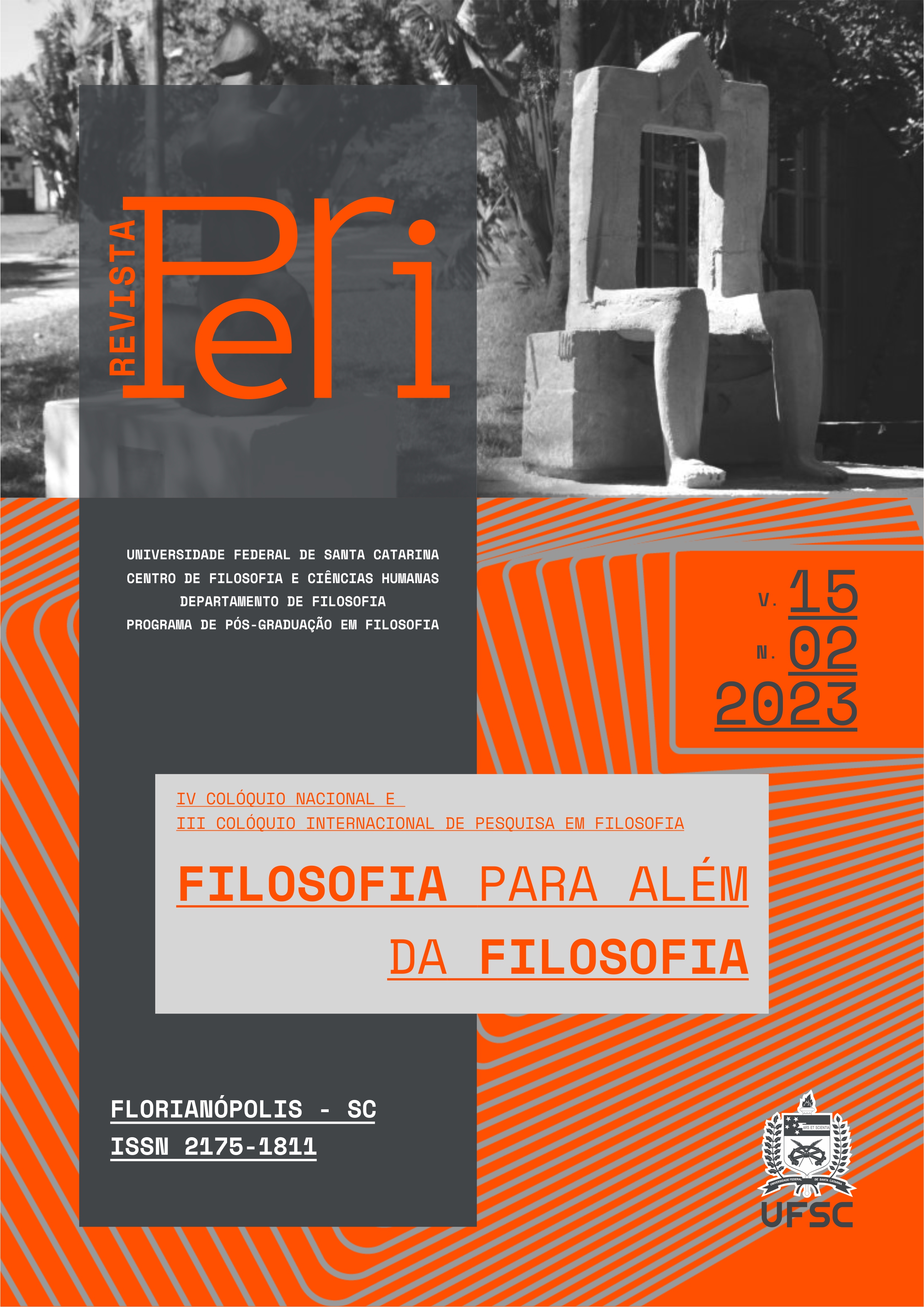Teses sobre o conceito de filosofia (mestiça) ou como livrar-se do fantasma da filosofia pura
Palavras-chave:
filosofia mestiça, filosofia puraResumo
Este ensaio aforismático apresenta algumas teses gerais sobre o conceito de filosofia, entendida em sua generalidade através do adjetivo ‘mestiça’ e em contraste crítico com a ideia e o mito de filosofia pura. Tais teses são acompanhadas por alguns dos argumentos em sua defesa, bem como por alguns de seus pressupostos e consequências metafilosóficos. De um lado, a partir dessas teses, procuro fazer uma caracterização abrangente e plural das possibilidades para fazer filosófico no mundo atual e no contexto da comunidade filosófica brasileira. De outro, a partir dessas mesmas teses, apresento uma genealogia e uma crítica do que denomino ‘fantasma da filosofia pura’. Essa metáfora conceitual indica a forma patológica pela qual a ideia e o mito da filosofia pura ainda dominam o imaginário da comunidade filosófica brasileira, limitando e distorcendo as possibilidades para o seu fazer filosófico. Essa genealogia e essa crítica se realizam diagnosticando três falsos dilemas gerados pelo fantasma da filosofia pura, apontando alguns meios para superá-los e potencializar nosso fazer filosófico sob o signo do conceito de filosofia mestiça.
Referências
CHRITCHLEY, Simon. What is continental philosophy? In: CHRITCHLEY, Simon; SCHROEDER, William (Org.). A companion to continental philosophy. Oxford: Blackwell, 1999.
NIETZSCHE, Friedrich. Also sprach Zarathustra: ein Buch für Alle und Keinen. In: COLLI, Giorgio; MONTINARI, Mazzino (Ed.). Nietzsche Werke. Kritische Gesamtausgabe, vol. 1. Berlim: De Gruyter, 1968.
Referências complementares:
DE MOURA, Carlos Alberto Ribeiro. História stultitiae e história sapientiae. In: ______. Racionalidade e crise: estudos de história da filosofia moderna e contemporânea. São Paulo: Discurso Editorial e Editora da UFPR, 2001, p. 13-42.
LOEB, Paul; MEYER, Matthew (Ed.). Nietzsche’s metaphilosophy: the nature, method, and aims of philosophy. Cambridge: Cambridge UP, 2019.
MARGUTTI, Paulo. Filosofia brasileira e pensamento descolonial. Sapere Aude, v. 9, n. 18, p. 223-239, 2018.
__________. História da filosofia do Brasil; vol. 1. São Paulo: Loyola, 2010.
MARQUES, Ubirajara Racan de Azevedo. A escola francesa de historiografia da filosofia: notas históricas e elementos de formação. São Paulo: Unesp, 2007.
OVERGAARD, Soren; GILBERT, Paul; BURWOOD, Stephen. An introduction to metaphilosophy. Cambridge: Cambridge UP, 2013.
RAMOS, Alberto Guerreiro. A redução sociológica. Rio de Janeiro: Editora da UFRJ, 1996 (1958).
RIBEIRO, Darcy. O povo brasileiro: a formação e o sentido do Brasil. Rio de Janeiro: Global, 2010 (1995).
Downloads
Publicado
Versões
- 2024-01-16 (2)
- 2023-12-29 (1)
Edição
Seção
Licença
Copyright (c) 2023 Nazareno Eduardo de Almeida

Este trabalho está licenciado sob uma licença Creative Commons Attribution-NonCommercial-ShareAlike 4.0 International License.
1. Autores mantém os direitos autorais e concedem à revista o direito de primeira publicação, com o trabalho simultaneamente licenciado sob a Creative Commons Attribution License que permite o compartilhamento do trabalho com reconhecimento da autoria do trabalho e publicação inicial nesta revista.
2. Autores têm autorização para assumir contratos adicionais separadamente, para distribuição não-exclusiva da versão do trabalho publicada nesta revista (ex.: publicar em repositório institucional ou como capítulo de livro), com reconhecimento de autoria e publicação inicial nesta revista.
3. Autores têm permissão e são estimulados a publicar e distribuir seu trabalho online (ex.: em repositórios institucionais ou na sua página pessoal) a qualquer ponto antes ou durante o processo editorial, já que isso pode gerar alterações produtivas, bem como aumentar o impacto e a citação do trabalho publicado (Veja O Efeito do Acesso Livre).


